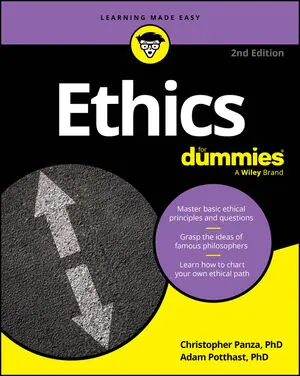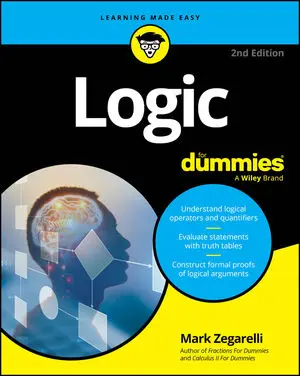Articles & Books From Philosophy
Your approachable guide to ethical philosophy Ethics For Dummies, 2nd Edition is an easy-to-grasp introduction to the branch of philosophy that deals with living a good life. Learn about the most important concepts and thinkers in the world of ethics, so you can analyze issues in the modern world from an ethical perspective.
An accessible resource to help you puzzle out logic concepts Logic For Dummies, 2nd Edition explains all the varied ways we use logic in philosophy, science, and everyday life. College students taking a logic course and lifelong learners alike can benefit from this accessible guide to logic concepts—such as syllogisms, constructing proofs and refutations, propositional and predicate logic, symbolic logic, modal and fuzzy logic, deductive and inductive reasoning, and beyond.
The philosophy that will help you become more resilient in the face of life’s challenges Stoicism For Dummies will teach you the basic principles of stoic philosophy and show you how it can help you navigate the ups and downs of life. We all face challenges and setbacks, and, if we have the right mindset, we can sail through them with ease.
Cheat Sheet / Updated 12-21-2023
Stoicism is an ancient philosophy that has become amazingly popular throughout the world in just the past few years. Philosophy? Popular? Yes, it is amazing. But it’s also true. In business, sports, entertainment, and the military, Stoicism is huge.Stoicism got its start in Athens, Greece around the year 300 BCE.
Article / Updated 06-06-2023
Much of Western philosophy finds its basis in the thoughts and teachings of Socrates, Plato, and Aristotle. You can't begin a study of world philosophy without talking about these guys: the Big Three ancient Greek philosophers. Socrates: Athens' street-corner philosopher Socrates was the big-city philosopher in ancient Athens.
You think, therefore you are. Get a straightforward rundown on philosophy from the ancient world to today If you’ve ever pondered your existence over your morning coffee or considered the nature of crime and punishment, you’re an amateur philosopher. From everyday questions about happiness and responsibility to deep, spiritual examinations about God and the cosmos, philosophy pervades every part of our lives.
Cheat Sheet / Updated 03-14-2022
There is a sense that philosophy is a very long conversation reaching through the centuries (and actually now millennia) about things that deeply matter, hopefully, leading to an understanding of human life and its place in the broader world.This Cheat Sheet provides a quick reference to what philosophy is and how it relates to knowledge, how people perceive themselves, the concepts of good, bad, death, God, and more.
Cheat Sheet / Updated 03-10-2022
No doubt you've heard someone speaking of an "existential crisis." What does that really mean, anyway? Existentialists believe that we're born without purpose into a world that makes no sense — but each person has the ability to create his or her own sense of meaning and peace. Discover who invented this relatively new school of philosophy as well as what concepts define existentialism.
Cheat Sheet / Updated 02-14-2022
Logic is more than a science, it’s a language, and if you’re going to use the language of logic, you need to know the grammar, which includes operators, identities, equivalences, and quantifiers for both sentential and quantifier logic. And, if you’re studying the subject, exam tips can come in handy.Sentential logic operators, input–output tables, and implication rulesWorking with sentential logic means working with a language designed to express logical arguments with precision and clarity.
Article / Updated 12-29-2021
The content you are looking for was recently moved. Don't worry, it's still here; it just has a new address:






